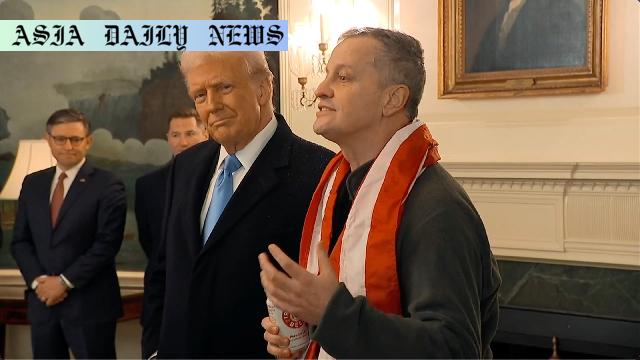Marc Fogel: US teacher freed from Russian detention in exchange deal negotiated by the Trump administration.
- Marc Fogel, a US teacher detained in Russia, was released as part of an exchange deal.
- Fogel was arrested in 2021 for possessing medical marijuana and sentenced to 14 years in prison.
- Trump administration officials, including Steve Witkoff, helped negotiate his release.
- Fogel’s release highlights evolving diplomatic ties amidst ongoing global tensions.

Introduction and Context
In a significant development, the United States has successfully secured the release of Marc Fogel, a US schoolteacher detained in Russia. Fogel was arrested in Russia in 2021 for possessing medical marijuana while teaching at a school for English-speaking students in Moscow. Despite his claim of needing the substance for medical purposes, he was sentenced to an extensive 14-year prison term. His case drew significant attention, shedding light on tense diplomatic relations and harsh sentencing practices abroad.
The Negotiation and Exchange
The Trump administration facilitated Fogel’s release in what has been described as an exchange deal. US National Security Advisor Mike Waltz announced that Fogel was en route to his home in the United States. However, the exact terms of the exchange or what the US provided in return remain undisclosed. Reports have indicated that this diplomatic move is part of broader efforts to demonstrate goodwill and potentially ease tensions with Russia amidst complex global challenges, including the war in Ukraine.
The Role of Steve Witkoff
A notable figure in the negotiations was Steve Witkoff, Trump’s special envoy to the Middle East. Witkoff personally flew to Moscow aboard his private aircraft, marking the first prominent US visit to the Russian capital since 2021, when CIA Director William Burns made a trip regarding another high-profile issue. While the exact nature of Witkoff’s involvement has not been detailed, his participation underscores the importance of personal diplomacy in high-stakes exchanges.
A Diplomatic Milestone
Marc Fogel’s release may reflect a subtle shift in US-Russia relations, albeit one that remains fragile given the ongoing war in Ukraine and other geopolitical conflicts. National Security Advisor Waltz characterized the release as a promising sign of improving relations, although it remains too early to determine whether this will lead to more significant breakthroughs in diplomacy.
The War in Ukraine and Its Implications
Amidst the backdrop of the Russia-Ukraine war, the exchange has been met with mixed reactions. While some perceive this move as a step toward peace, others caution against interpreting it as a signal of goodwill from Moscow. The broader geopolitical stakes continue to complicate US-Russia relations, requiring measured responses from the international community.
Advocacy and Public Reaction
Advocates had long called for Fogel’s release, highlighting concerns over his health and the harsh conditions of Russian prisons. His extended sentence for possessing a small amount of medical marijuana was widely criticized as disproportionate and politically motivated. The news of his return has been celebrated by his family, the teaching community, and activists advocating for Americans detained abroad.
Unanswered Questions
Despite the positive development, questions remain about what the US conceded in the exchange. Historically, such negotiations often involve sensitive agreements that are not immediately disclosed to the public. Transparency organizations and media outlets may continue to press for clarity regarding any concessions made by the US government.
Conclusion and Future Implications
Marc Fogel’s release signifies a crucial victory in diplomacy and a reminder of how delicate international negotiations can be. While his freedom offers immense relief to his family and supporters, the case underscores the complex matrix of global politics that influences such decisions. As the world continues to navigate these challenges, Fogel’s release serves as an emblem of hope and the potential for dialogue even amidst stark geopolitical divides.



Commentary
The Significance of Marc Fogel’s Release
The release of Marc Fogel is undoubtedly a pivotal moment for US-Russia relations, even as the broader political landscape remains fraught with complexity. Fogel’s case highlights the often-overlooked plight of ordinary citizens caught in the crossfire of international politics. His prolonged detention for possessing medical marijuana was a stark reminder of how justice can sometimes take a backseat to broader geopolitical agendas.
The Power of Diplomacy
This successful negotiation underscores the enduring relevance of diplomacy, even when relations between nations are strained. The Trump administration’s efforts, particularly those of Steve Witkoff, illustrate the importance of engaging directly with other nations to resolve high-stakes human rights issues. Diplomacy is not merely about treaties and deals; it is about enabling people to return to safety and freedom, as in Fogel’s case.
Moving Forward
While the release is worth celebrating, it is crucial to consider its implications. Does this represent a genuine thaw in US-Russia relations, or was it an isolated incident? The ongoing conflict in Ukraine and tensions over various other issues suggest that much work remains to be done. Nevertheless, the development indicates that dialogue is possible, even under less-than-ideal circumstances.
A Broader Perspective
Marc Fogel’s story serves as a reminder of the larger issues surrounding Americans detained abroad, often for reasons that may seem disproportionate. His release shines a light on the necessity for governments and advocacy groups to work persistently to secure the freedom of those who may be unfairly imprisoned. It also reminds us of the broader responsibility to uphold human rights globally.
In the end, one hopes that this moment not only marks the triumph of a single individual returning home but also sets a precedent for further productive negotiations between nations in the future.